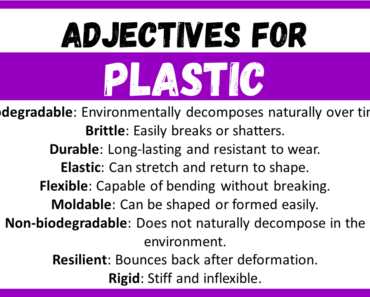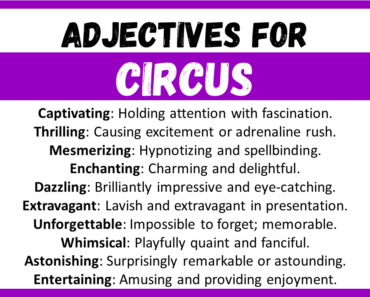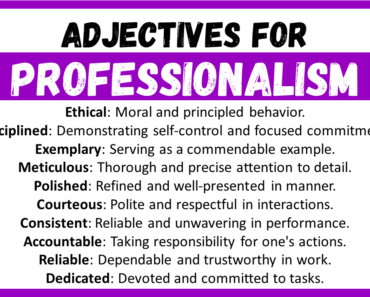In the vast realm of language, “something” serves as an enigmatic and versatile entity, encapsulating the myriad wonders of existence. When seeking to elucidate its essence, we turn to the power of “words to describe something.” These linguistic tools form the building blocks of communication, enabling us to convey thoughts, emotions, and experiences with eloquence and precision. From the ethereal beauty of nature to the intricacies of human emotions, the right words can breathe life into the intangible, opening a doorway to understanding and connection.
Adjectives for Something
Here are the 20 Most Popular adjectives for something:
- Amorphous
- Bizarre
- Curious
- Diverse
- Enigmatic
- Fickle
- Grand
- Hidden
- Intriguing
- Jovial
- Kaleidoscopic
- Luminous
- Mystical
- Nebulous
- Opulent
- Puzzling
- Quixotic
- Radiant
- Serene
- Transcendent
Adjectives for “something bad”:
- Terrible
- Horrible
- Awful
- Dreadful
- Unpleasant
- Repugnant
- Abominable
- Atrocious
- Disastrous
- Wretched
Adjectives for “something good”:
- Wonderful
- Excellent
- Fantastic
- Amazing
- Terrific
- Delightful
- Outstanding
- Superb
- Marvelous
- Splendid
Adjectives for “something new”:
- Novel
- Fresh
- Innovative
- Modern
- Contemporary
- Original
- Unprecedented
- Revolutionary
- Cutting-edge
- State-of-the-art
Words to Describe Something with Meanings
- Amorphous: Without definite shape or form.
- Bizarre: Strikingly unusual or peculiar.
- Curious: Eager to know or learn something.
- Diverse: Varied in different aspects.
- Enigmatic: Mysterious or puzzling in nature.
- Fickle: Instable and liable to change.
- Grand: Impressive and magnificent in scale.
- Hidden: Concealed or not easily noticed.
- Intriguing: Arousing curiosity or interest.
- Jovial: Cheerful and full of joy.
- Kaleidoscopic: Constantly changing, diverse and colorful.
- Luminous: Emitting light or shining brightly.
- Mystical: Relating to spiritual or mysterious powers.
- Nebulous: Vague or hazy, lacking clarity.
- Opulent: Luxurious and wealthy in appearance.
- Puzzling: Confusing or difficult to understand.
- Quixotic: Unrealistically idealistic or impractical.
- Radiant: Emitting light or shining brightly.
- Serene: Calm, peaceful, and undisturbed.
- Transcendent: Beyond ordinary human experience or understanding.
Example Sentences for Something Adjectives
- The amorphous blob oozed across the floor.
- The Halloween costume had a bizarre design.
- The curious child explored the forest eagerly.
- The city boasts a diverse cultural heritage.
- Her smile held an enigmatic charm.
- The weather is fickle this time of year.
- They held a grand celebration for the victory.
- Hidden treasures lie buried in the sand.
- The detective found an intriguing clue.
- The jovial crowd celebrated the festival together.
- The museum displayed a kaleidoscopic array of art.
- The stars in the night sky looked luminous.
- She claimed to possess mystical powers.
- The nebulous mist obscured the valley.
- The palace showcased opulent furnishings.
- The puzzle proved puzzling for most players.
- His quixotic dreams led him on daring quests.
- The sunflowers looked radiant in the sunlight.
- The lake was calm and serene at dawn.
- The performance was a transcendent experience.
Explore More Words:
FAQ’s
How to describe something in writing?
To describe something in writing, use vivid adjectives and sensory details to paint a clear picture for the reader. Engage the reader’s imagination by using descriptive language that appeals to their senses.
How do you describe an object?
When describing an object, focus on its physical appearance, size, color, texture, and any unique features it possesses. Provide specific details that allow the reader to visualize the object clearly and understand its significance.








